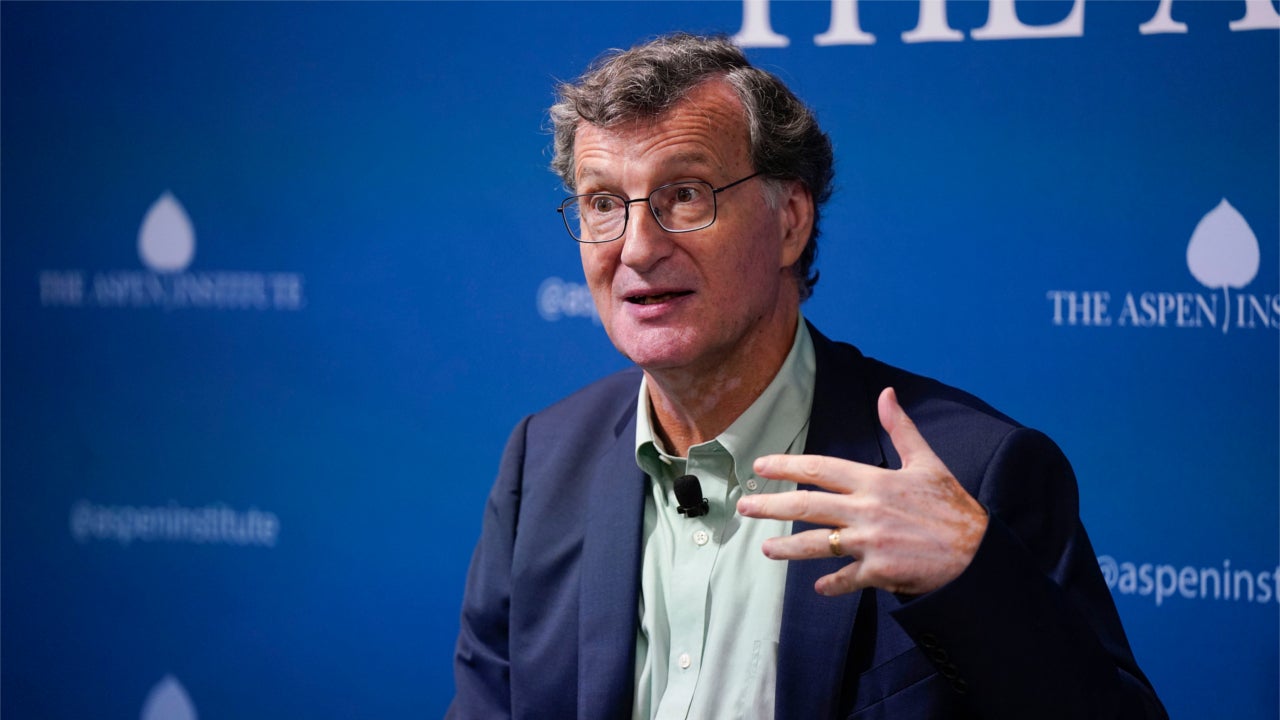We are pleased to bring you the latest edition of the Economic Opportunities Program’s newsletter! Learn how EOP and its initiatives are working to help low- and moderate-income Americans thrive in a changing economy.
Why Free Child Care is More Important Than Free College
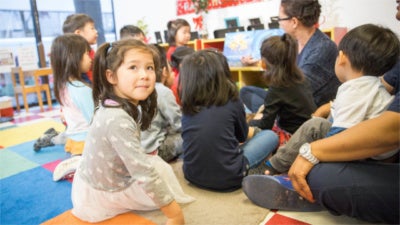 “Free college” plans are garnering headlines. For many parents, however, affordable child care is the more urgent need. In a commentary in Spotlight on Poverty and Opportunity, EOP Executive Director Maureen Conway and Good Companies/Good Jobs Initiative Director Mark Popovich discuss how a system of free child care would address a widespread issue that limits labor force participation and success for many working people. In the piece, they outline key reasons why free child care should be a priority investment to mitigate the inequitable access to opportunity that too often begins before kindergarten and to lay the foundation for tomorrow’s economic success.
“Free college” plans are garnering headlines. For many parents, however, affordable child care is the more urgent need. In a commentary in Spotlight on Poverty and Opportunity, EOP Executive Director Maureen Conway and Good Companies/Good Jobs Initiative Director Mark Popovich discuss how a system of free child care would address a widespread issue that limits labor force participation and success for many working people. In the piece, they outline key reasons why free child care should be a priority investment to mitigate the inequitable access to opportunity that too often begins before kindergarten and to lay the foundation for tomorrow’s economic success.
Sharing Tools to Help Leaders Put Job Quality in Practice
 Lack of access to quality jobs is a key contributor to rising inequality. With support from Prudential Financial, EOP is launching a new effort to encourage the development of job quality practices that promote access to economic opportunity. Through this initiative we will provide actionable tools and guidance to encourage leaders across geographies and fields to engage in practical action to improve job quality in their local communities and connect to a growing national conversation. On November 25, we hosted our first Job Quality in Practice webinar, which focused on resources and strategies for assessing job quality within a local labor market and the importance of including considerations of disparities by race, ethnicity and gender in local assessments. Experts shared approaches and useful data sources for assessing job quality in a regional labor market. Learn more about this work and how you can get involved here.
Lack of access to quality jobs is a key contributor to rising inequality. With support from Prudential Financial, EOP is launching a new effort to encourage the development of job quality practices that promote access to economic opportunity. Through this initiative we will provide actionable tools and guidance to encourage leaders across geographies and fields to engage in practical action to improve job quality in their local communities and connect to a growing national conversation. On November 25, we hosted our first Job Quality in Practice webinar, which focused on resources and strategies for assessing job quality within a local labor market and the importance of including considerations of disparities by race, ethnicity and gender in local assessments. Experts shared approaches and useful data sources for assessing job quality in a regional labor market. Learn more about this work and how you can get involved here.
How Do We Build an Economy That Offers Prosperity for All?
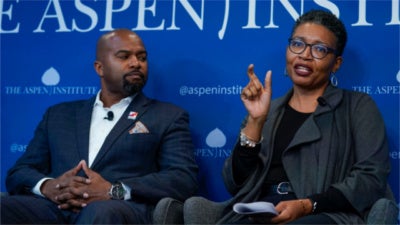 While our economy continues to grow, our country’s prosperity is not broadly shared. Although unemployment is low, too many working people still struggle to make ends meet or build enough wealth to provide a stable life for themselves and their families. This month, we hosted a panel conversation, “Building a Democratic Economy: How Do We Create Prosperity for All?,” to explore how we can create a new economic system that builds prosperity for all and ensures that everyone shares in the wealth that our economy generates. The discussion featured remarks from Marjorie Kelly on her new book, The Making of a Democratic Economy, and a panel moderated by BOI Director Joyce Klein with two local leaders who are working to advance equity in their communities.
While our economy continues to grow, our country’s prosperity is not broadly shared. Although unemployment is low, too many working people still struggle to make ends meet or build enough wealth to provide a stable life for themselves and their families. This month, we hosted a panel conversation, “Building a Democratic Economy: How Do We Create Prosperity for All?,” to explore how we can create a new economic system that builds prosperity for all and ensures that everyone shares in the wealth that our economy generates. The discussion featured remarks from Marjorie Kelly on her new book, The Making of a Democratic Economy, and a panel moderated by BOI Director Joyce Klein with two local leaders who are working to advance equity in their communities.
How “Now Jobs” Can Help Young People Build Their Careers
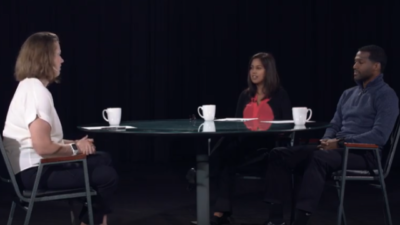 “Now jobs” can help connect young adults to employment that addresses immediate income needs, provides them with valuable work experience, and improves their social capital by connecting them to networks of employed adults. A new video series from the Annie E. Casey Foundation featuring EOP Senior Evaluation Manager Ranita Jain looks into how the foundation’s Generation Work partnerships are using a “now jobs” strategy to help young adults meet immediate needs while preparing for long-term career opportunities. The series, moderated by Allison Gerber of the Annie E. Casey Foundation, also features Taylor Hopkins, coach at a Goodwill Education Initiative Excel Center in Indianapolis, discussing how his organization uses this approach. You can also read our brief on “now jobs” here.
“Now jobs” can help connect young adults to employment that addresses immediate income needs, provides them with valuable work experience, and improves their social capital by connecting them to networks of employed adults. A new video series from the Annie E. Casey Foundation featuring EOP Senior Evaluation Manager Ranita Jain looks into how the foundation’s Generation Work partnerships are using a “now jobs” strategy to help young adults meet immediate needs while preparing for long-term career opportunities. The series, moderated by Allison Gerber of the Annie E. Casey Foundation, also features Taylor Hopkins, coach at a Goodwill Education Initiative Excel Center in Indianapolis, discussing how his organization uses this approach. You can also read our brief on “now jobs” here.
The Importance of Addressing Barriers to Entrepreneurship
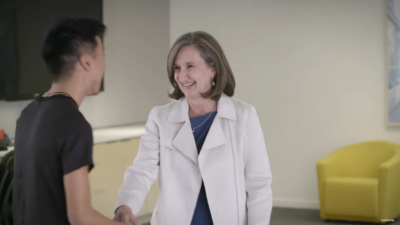 BOI Director Joyce Klein features in “Made in America,” a new series from GoDaddy exploring the challenges that entrepreneurs, especially women and people of color, face in starting a business. Joyce discusses how, despite higher rates of entrepreneurship among people of color, historical inequities such as redlining and targeted predatory lending mean many potential business owners don’t have access to the sources of capital most often used to launch and grow businesses. You can watch the full series here.
BOI Director Joyce Klein features in “Made in America,” a new series from GoDaddy exploring the challenges that entrepreneurs, especially women and people of color, face in starting a business. Joyce discusses how, despite higher rates of entrepreneurship among people of color, historical inequities such as redlining and targeted predatory lending mean many potential business owners don’t have access to the sources of capital most often used to launch and grow businesses. You can watch the full series here.
Fostering Connections Among Local Workforce Leaders
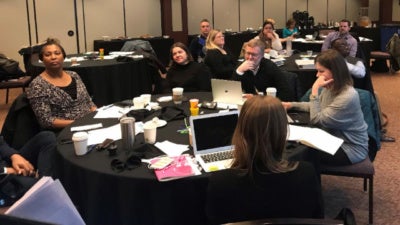 Our Workforce Leadership Academies continue to meet, fostering new and deeper connections among local workforce and economic leaders. In the Academy sessions, Fellows work to develop strategies that strengthen their ability to address shared workforce ecosystem challenges. The Hudson County, New Jersey, Academy held a session on building partnerships for systems change, working through a case study with Workforce Matters Founder Dazzie McKelvy. Two Academies – Chicago and New Orleans – held their closing retreats this month and are preparing to present their collaborative projects to local community stakeholders in December. The Dallas Academy will convene its Fellows again in December to engage with a panel of local stakeholders who work at the intersection of child care, transportation, and housing and the workforce ecosystem and to analyze their own organizations’ needs and strengths related to race, equity, and inclusion. We’re also excited to announce our latest Academy in Detroit. Applications are open until December 9, and interested local workforce professionals can find more information here.
Our Workforce Leadership Academies continue to meet, fostering new and deeper connections among local workforce and economic leaders. In the Academy sessions, Fellows work to develop strategies that strengthen their ability to address shared workforce ecosystem challenges. The Hudson County, New Jersey, Academy held a session on building partnerships for systems change, working through a case study with Workforce Matters Founder Dazzie McKelvy. Two Academies – Chicago and New Orleans – held their closing retreats this month and are preparing to present their collaborative projects to local community stakeholders in December. The Dallas Academy will convene its Fellows again in December to engage with a panel of local stakeholders who work at the intersection of child care, transportation, and housing and the workforce ecosystem and to analyze their own organizations’ needs and strengths related to race, equity, and inclusion. We’re also excited to announce our latest Academy in Detroit. Applications are open until December 9, and interested local workforce professionals can find more information here.
Entrepreneurship and Youth in Action
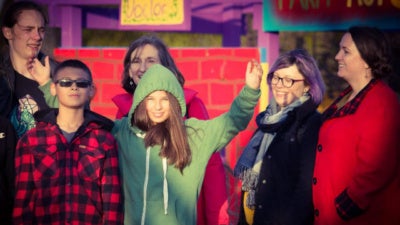 BOI Director Joyce Klein, along with Yelena Nemoy of the Aspen Institute Forum for Community Solutions, visited the Del Norte and Tribal Lands Opportunity Youth Initiative to learn more about how it is integrating entrepreneurship programming into its efforts to engage opportunity youth in building skills and addressing community challenges. The site visit will result in a case study that builds on BOI and the Forum’s report “Creating Entrepreneurship Pathways for Opportunity Youth.”
BOI Director Joyce Klein, along with Yelena Nemoy of the Aspen Institute Forum for Community Solutions, visited the Del Norte and Tribal Lands Opportunity Youth Initiative to learn more about how it is integrating entrepreneurship programming into its efforts to engage opportunity youth in building skills and addressing community challenges. The site visit will result in a case study that builds on BOI and the Forum’s report “Creating Entrepreneurship Pathways for Opportunity Youth.”
EOP on the Road
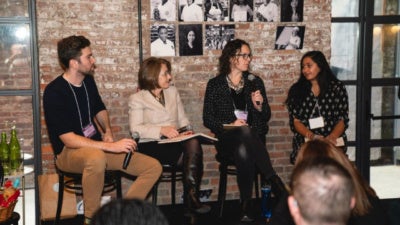 EOP Executive Director Maureen Conway joined a panel at The Kitchen Conference, presented by Hot Bread Kitchen in Brooklyn, New York, discussing job quality in food jobs. Maureen discussed the need to rethink how businesses operate to better support workers and develop systems where businesses and workers succeed together. You can find a summary of the event here.
EOP Executive Director Maureen Conway joined a panel at The Kitchen Conference, presented by Hot Bread Kitchen in Brooklyn, New York, discussing job quality in food jobs. Maureen discussed the need to rethink how businesses operate to better support workers and develop systems where businesses and workers succeed together. You can find a summary of the event here.
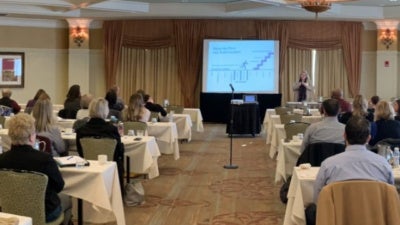 EOP Research Director Amy Blair kicked off the Pennsylvania Workforce Development Association’s annual Youth Summit in Hershey last week. Amy discussed a range of strategies for building or expanding a focus on job quality front-line workforce development work monitoring and weighing in locally about public economic development investments to encourage the attraction and creation of good quality jobs in a region. She provided information about a recently released toolkit for learning about the future of work on the ground in communities, which EOP collaborated on with the Aspen Institute Forum for Community Solutions.
EOP Research Director Amy Blair kicked off the Pennsylvania Workforce Development Association’s annual Youth Summit in Hershey last week. Amy discussed a range of strategies for building or expanding a focus on job quality front-line workforce development work monitoring and weighing in locally about public economic development investments to encourage the attraction and creation of good quality jobs in a region. She provided information about a recently released toolkit for learning about the future of work on the ground in communities, which EOP collaborated on with the Aspen Institute Forum for Community Solutions.
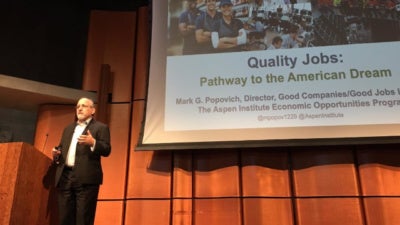 Good Companies/Good Jobs Director Mark Popovich spoke at the San Diego Workforce Partnership this month, sharing his initiative’s innovative approach to supporting job quality by benchmarking businesses’ jobs against their peers. Mark shared how providing a look into a business’s job quality can be a valuable metric for lenders, investors, and procurement officers, and provide an incentive for employers to improve wages, benefits, and retention.
Good Companies/Good Jobs Director Mark Popovich spoke at the San Diego Workforce Partnership this month, sharing his initiative’s innovative approach to supporting job quality by benchmarking businesses’ jobs against their peers. Mark shared how providing a look into a business’s job quality can be a valuable metric for lenders, investors, and procurement officers, and provide an incentive for employers to improve wages, benefits, and retention.
Jaime Fall, director of UpSkill America, gave a keynote address at the super regional meeting of UPCEA, in Denver, Colorado, discussing why employers are investing in the education, training, and development of their employees; providing examples of the types of programs employers are investing in; and sharing what employers say they are looking for from partner institutions.
Senior Project Manager Jenny Weissbourd led a Solutions Session at the Federal Reserve Bank of Philadelphia’s convening on Business Innovations for the Future of Work. During the session, human resources and nonprofit professionals used EOP’s Cost of Turnover Tool to estimate the financial impact of losing workers, and discussed how they would use their findings to make a business case for workforce practice changes that improve retention.
Senior Research Associate Amanda Newman facilitated a Solutions Salon at the Retail Opportunity Network annual conference focused on how practitioners can embed equity and inclusion into their internal practices and approaches.
Upcoming at EOP
UpSkill America will celebrate its fifth anniversary in January at an event bringing together business leaders, researchers, policymakers, and upskilling program graduates to share key learning from the past five years, highlight innovative approaches to upskilling, discuss solutions to common challenges, and explore the future of the upskilling movement. Since its founding, the initiative has collaborated with businesses to develop new programs and approaches that make it easier for workers to advance their careers. We look forward to discussing the lessons of the last five years and exploring the future of upskilling. You can register for the event here.
Join the conversation
Follow us on social media to join the conversation.
Tweet What’s new at EOP? Learn how the @AspenInstitute Economic Opportunities Program is helping people connect to and thrive in a changing economy.
About EOP
The Economic Opportunities Program (EOP) advances strategies, policies, and ideas to help low- and moderate-income people thrive in a changing economy. We recognize that race, gender, and place intersect with and intensify the challenge of economic inequality and we address these dynamics by advancing an inclusive vision of economic justice. For over 25 years, EOP has focused on expanding individuals’ opportunities to connect to quality work, start businesses, and build economic stability that provides the freedom to pursue opportunity. For more information, visit as.pn/eop.
EOP has several initiatives, including the Business Ownership Initiative, Workforce Strategies Initiative, UpSkill America, and Good Companies/Good Jobs. In addition, across these approaches EOP hosts the Economic Opportunity Fellows Network and the Opportunity in America event series.
The Aspen Institute is an educational and policy studies organization based in Washington, DC. Its mission is to foster leadership based on enduring values and to provide a nonpartisan venue for dealing with critical issues.
Thank you to our many partners and funders for supporting our efforts.
Keep in touch
Click here to join our mailing list or sign up below. For updates every day, follow us on social media.
